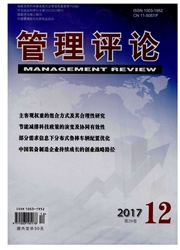

 中文摘要:
中文摘要:
“上门”型O2O模式是一种新型的电子商务模式,受到了社会各界的广泛关注,但目前学术界和实践界对其构成要素及各要素间的关系还没有一个体现其特点的界定。本文以国内3个该领域的领先企业(饿了么、泰迪洗涤、滴滴出行)为案例,借鉴扎根理论的程序化编码方法,清晰界定了价值主张(包括核心服务和上门服务)、价值创造网络(包括网络成员、关键业务和关键资源)和价值实现(包括收入来源和成本结构)三个方面的构成要素,同时从动态的角度归纳出了以上三个要素间的关系,如价值主张和价值创造网络间的价值实现机制和价值主张调整机制,价值创造网络和价值实现间的收益分配机制和分配调整机制。
 英文摘要:
英文摘要:
Although" door to door" O2O model, as a new business model of electronic commerce, receives much concern from both prac- titioners and scholars, the elements and their relationships are not defined clearly. Drawing upon 3 leading players in China' s e-com- merce sector:Eleme, Tidy Washing and Didi, this paper induces three elements: value proposition (including key service and door to door service) , value creating network (including network member, key operation process and key resource) and value realization (in- cluding structure of cost and source of revenue) through coding approach of Grounded Theory. The relationships between value proposi- tion and value creating network are mechanism of value realization and mechanism of adjusting value proposition. The relationships be- tween value creating network and value realization are mechanism of revenue distribution and mechanism of adjusting revenue distribu- tion. These relationships are induced from dynamic perspective.
 同期刊论文项目
同期刊论文项目
 同项目期刊论文
同项目期刊论文
 期刊信息
期刊信息
